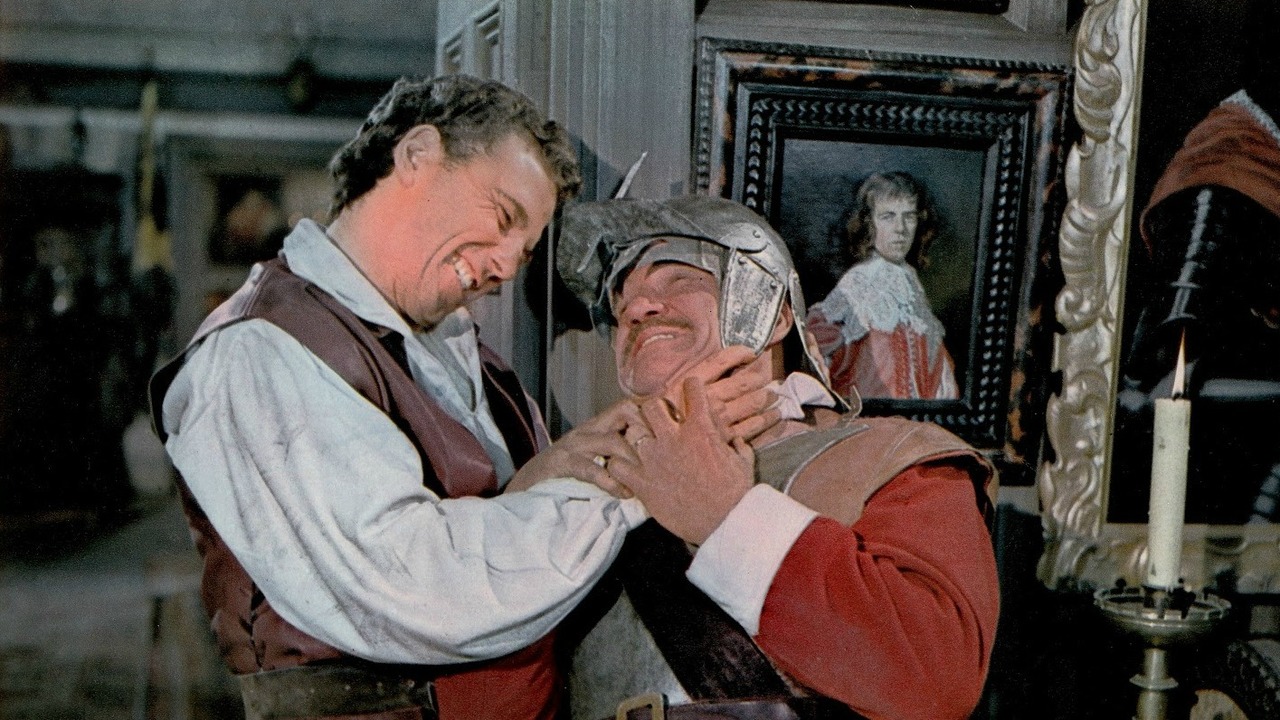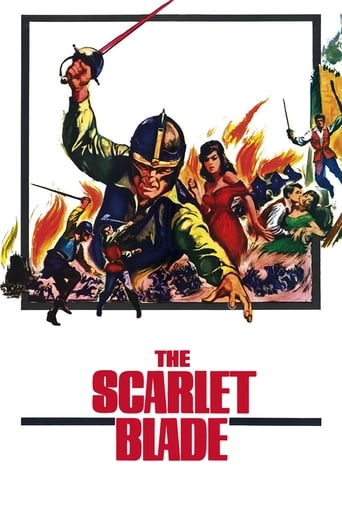BlazeLime
Strong and Moving!
Kailansorac
Clever, believable, and super fun to watch. It totally has replay value.
FrogGlace
In other words,this film is a surreal ride.
Leofwine_draca
One of my fondest TV memories from my childhood in the '80s was a spoof adventure serial called THE FLASHING BLADE which they used to show on Saturday morning telly - Going Live, I believe. In it, a rebel hero won the hearts of women around him and valiantly fought off oppressors, and altogether it was a witty and affectionate spoof. Finally, fifteen years on, I catch up with the film which inspired that spoof.THE SCARLET BLADE is an entertaining Hammer swashbuckler, a colourful and lively romp with direction from the stalwart John Gilling, who can usually be relied upon to deliver a dependable movie. The period setting is as good as ever in a Hammer movie, horror or otherwise, and the various action sequences are very well staged and always exciting. On a technical level, the movie is above average in almost every respect. The plot, on the other hand, is basic stuff which happily focuses more on complex characters than other adventures of the period (a lot of Italian movies, for instance). However, it's the acting which stops this film from being an outright classic.Taking the lead of the swashbuckling hero is Jack Hedley (who he?), unfortunately not one of Hammer's most charismatic leads. Sure, he's fine with the physical stuff but otherwise he's quickly forgotten. The same with female lead and love interest June Thorburn, and despite being a traitor her performance is quite uninteresting and the romance between her and Hedley slows the pacing of the film down somewhat. Thankfully two British dependables are on hand to raise the interest a little. First up is Lionel Jeffries, putting in another nice pompously villainous turn, although the film has a slight twist at the end to redeem his character somewhat. By far the most interesting actor in the film is Oliver Reed. Although he's only supporting, he takes on the complex part of one of Jeffries' men, also a traitor, who secretly loves Thorburn and is pushed out into the cold when she falls in love with Hedley. Reed gives a quiet turn as the role calls for, but is also very intense and brooding in the part and his performance excellent as usual. Definitely an undervalued actor. Apart from Reed, this is lightweight and simplistic stuff, old-fashioned escapism which is fun to watch on a rainy afternoon.
JohnHowardReid
Despite its big reputation, not all Hammer Films are worth watching. In fact, "The Scarlet/Crimson Blade" fully deserves its reputation as a movie swashbuckler with lots of buckle but little swash. There is not a great deal of action, but plenty of plot machinations and lots of dialog. It was obviously filmed on a limited budget. The sets are attractive, but the costumes look too new to be real. Not much use is made of the wide screen. The emphasis is firmly on the players. Fortunately, they are made to look attractive by skillful photography. Lionel Jeffries' screen persona is usually that of a comedian, and he is hard to accept as a straight villain. The direction is capable but unimaginative and lacks the dash and pace a swashbuckler really needs for complete success. Director John Gilling can usually do much better than this. Maybe he was constrained by the producer's demand for speed.
bkoganbing
The English Civil War much like our own in America has been fodder for numerous historical adventure stories. And the stories have been told from both the Cavalier and Roundhead sides with each taking turn at being the hero and villain of same. It was that kind of period in the United Kingdom history, subject to many different interpretations on all sides.In this one the Royalist cavaliers are the heroes, they've been driven underground pretty much in 1648 and are now concerned with rescuing King Charles I and spiriting him away to safe exile. Charles is now in the custody of Colonel Lionel Jeffries and Captain Oliver Reed of Oliver Cromwell's Ironsides army and is on the way to London for trial and execution. Jeffries has set up headquarters in the manor of the Beverleys who were Royalists now dispossessed of their property. Jeffries is one real pig as I recall and not living the spartan puritan life that his kind were wont to preach about. He's even got a marriage arranged for his daughter June Thorburn to Oliver Reed. But June's a secret Royalist whose heart is set on Jack Hedley the elder of the two Beverley brothers who is leader of an underground group of Royalists.The intrigue in trying to rescue the King is tangled up with the romantic intrigue of this triangle and it leads to a lot of tragedy all around. History tells us what happened to Charles I, if he ruled rather badly, he certainly died nobly for his cause. As for the personal intrigues, you have to see the film for that.The Scarlet Blade was playing as the second half of a double bill as I recall, probably with some Hammer horror feature. I remember at the time thinking how much more interesting Oliver Reed was as the shrewd, but villainous Roundhead than Jack Hedley was as the dashing, but rather wooden cavalier. Maybe Thorburn ought to rethink what she's doing. Of course this was before Oliver Reed became an international star, but his appeal was dead-on.If you get a chance to see The Scarlet Blade, you'll see an average, but entertaining swashbuckler that might have been better with Reed as the hero.
heedarmy
This Hammer swashbuckler is one of the few films to be set during the English Civil War. Unfortunately, its treatment of the conflict is fairly simplistic ; the Roundheads are the baddies, intent on killing the king, and the Cavaliers are the romantic good guys, led by Jack Hedley, looking slightly too old to play the Robin Hood like hero.The film suffers from the fact that the "villains" (Lionel Jeffries, Oliver Reed) are much more charismatic than the "heroes" (Hedley and an insipid June Laverick). The downbeat ending is also a surprise. Nevertheless, like most Hammer films, it is well-mounted and richly-photographed by Jack Asher. Watch out for the sequence in which the outlaws, disguised as bushes (!), creep ever-closer to the Roundhead guards. It looks like a scene from Monty Python!

